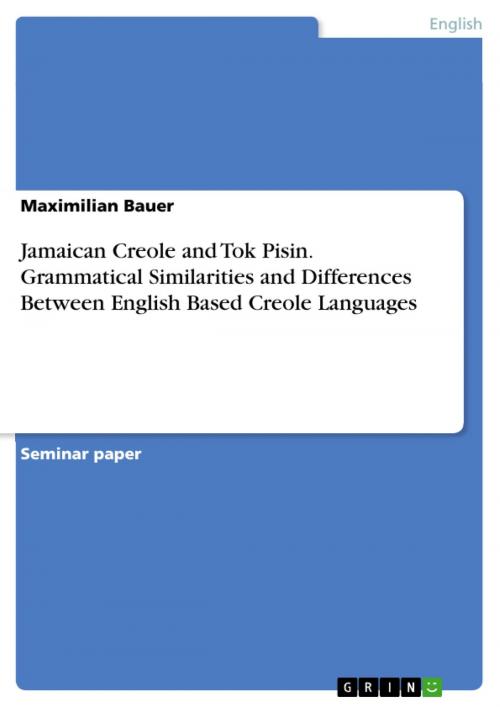Jamaican Creole and Tok Pisin. Grammatical Similarities and Differences Between English Based Creole Languages
Nonfiction, Entertainment, Drama, Anthologies| Author: | Maximilian Bauer | ISBN: | 9783668108424 |
| Publisher: | GRIN Verlag | Publication: | December 11, 2015 |
| Imprint: | GRIN Verlag | Language: | English |
| Author: | Maximilian Bauer |
| ISBN: | 9783668108424 |
| Publisher: | GRIN Verlag |
| Publication: | December 11, 2015 |
| Imprint: | GRIN Verlag |
| Language: | English |
Seminar paper from the year 2011 in the subject English Language and Literature Studies - Linguistics, grade: 1,7, University of Würzburg (Neuphilologisches Institut), course: Dialects of English, language: English, abstract: As Colonization in Europe emerged more and more countries all over the world were seized by Spanish, German, Dutch, Danish and English troops. As there was a problem of communication a new language between the English troops and settlers and the native people came up that is nowadays called a Pidgin language. It was a mixture of the indigenous language and the language of the invaders from Europe. When later the British brought the first slaves from other colonies mostly in Africa they also had a huge impact on this Pidgin language. As the time went by more and more of these colonies declared their independence but most of the influences to the life and the country in the colonies seemed irreversible. A very important impact was the one on the language of the former natives by African slaves and European settlers that inhabited the colonies for a long time. These influences can still be seen in modern times in education, lifestyle and of course the language. The Pidgin languages all over the world - today most of them developed to creoles - are still spoken. They have some distinct features in common but they also show differences concerning grammatical or syntactical features even if the spelling seems to be nearly the same. Therefore in my opinion it is worthwhile taking a closer look to those similarities and differences between Pidgin and Creole languages all over the world and to pick out some appropriate examples that maybe do not share a continent, but instead share linguistic features derived from actions and happenings of a former time whose impacts are still seen today.
Seminar paper from the year 2011 in the subject English Language and Literature Studies - Linguistics, grade: 1,7, University of Würzburg (Neuphilologisches Institut), course: Dialects of English, language: English, abstract: As Colonization in Europe emerged more and more countries all over the world were seized by Spanish, German, Dutch, Danish and English troops. As there was a problem of communication a new language between the English troops and settlers and the native people came up that is nowadays called a Pidgin language. It was a mixture of the indigenous language and the language of the invaders from Europe. When later the British brought the first slaves from other colonies mostly in Africa they also had a huge impact on this Pidgin language. As the time went by more and more of these colonies declared their independence but most of the influences to the life and the country in the colonies seemed irreversible. A very important impact was the one on the language of the former natives by African slaves and European settlers that inhabited the colonies for a long time. These influences can still be seen in modern times in education, lifestyle and of course the language. The Pidgin languages all over the world - today most of them developed to creoles - are still spoken. They have some distinct features in common but they also show differences concerning grammatical or syntactical features even if the spelling seems to be nearly the same. Therefore in my opinion it is worthwhile taking a closer look to those similarities and differences between Pidgin and Creole languages all over the world and to pick out some appropriate examples that maybe do not share a continent, but instead share linguistic features derived from actions and happenings of a former time whose impacts are still seen today.















